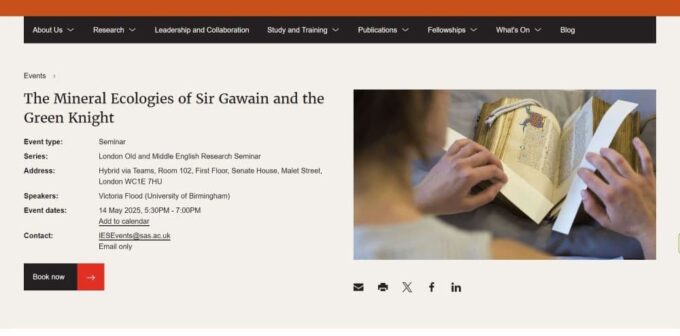“BE vs. HAVE in the perfect of mutative intransitive verbs: A study on the Middle English translation of Paris and Vienne”
Bibliographical details
Uchida, Mitsumi & Yoko Iyeiri. 2025. “BE vs. HAVE in the perfect of mutative intransitive verbs: A study on the Middle English translation of Paris and Vienne“. Kwansei Gakuin University School of Sociology Journal 144: 17-29. (Downloadable PDF)
This is another paper of our project on Middle English Paris and Vienne. On the basis of Leeu’s printing of the same text, we have discussed the competition between the be-perfect and the have-perfect of mutative intransitive verbs, examining various conditions influencing the choice between them. While we tested a number of linguistic environments so far adduced in previous studies on the be/have-perfect, we have also included the factor of translation from French. This is something that has not been discussed much in the literature. Most studies on the be-perfect investigate texts in the Late Modern English period, when the shift to the have-perfect was noticeable. However, the shift had started in much earlier periods in the history of English, and this paper show that Middle English is worth discussing as it gives a broader view on the development of perfect forms in English.
The following is an extract from the conclusion of this paper, which summarizes the findings discussed in this paper (pp. 26-27).
Through examination of a limited number of examples with mutative intransitive verbs extracted from Caxton’s translation, we confirmed that the shift towards the HAVE perfect was already in progress, displaying lexical variation: some verbs showed a strong preference for HAVE, while others persistently occurred with BE. We also investigated the potential influence of the French source text, focusing on corresponding verbal phrases. Our English French parallel data, though limited in number, revealed certain patterns in Caxton’s translation, suggesting that some of his choices may have been prompted by the expression he saw in the source text. There surely remain significant challenges. Tense, aspect (both lexical and grammatical), and voice systems were still unstable around the end of the fifteenth century —- and continue to be complex —- in both languages, necessitating more detailed and comprehensive investigation.
Related publications
- Uchida, Mitsumi & Yoko Iyeiri. 2017.“For and Because: A Comparative Study of Causal Conjunctions in Caxton’s Paris and Vienne and Three French Versions of the Same Text”, in Language Contact and Variation in the History of English, ed. Mitsumi Uchida, Yoko Iyeiri & Lawrence Schourup, pp. 61-79. Tokyo: Kaitakusha.
- Iyeiri, Yoko & Mitsumi Uchida. 2019. “Self-forms in Caxton’s Paris and Vienne“. Kwansei Gakuin University School of Sociology Journal 131: 47-64. (Downloadable PDF)
- Yoko Iyeiri and Mitsumi Uchida. 2020. “Describing the process of lexical borrowing: intend and other related words in late Middle English”. Kwansei Gakuin University School of Sociology Journal 135: 57-69. (Downloadable PDF)
- Iyeiri, Yoko & Mitsumi Uchida. 2021. “Etymological Spellings in William Caxton’s Translations”. English Studies 102(8): 991-1001.
- Uchida, Mitsumi & Yoko Iyeiri. 2023. “Etymological and Non-etymological Spellings of FALCON and SOLDAN (SULTAN) in Caxton’s Paris and Vienne and Some Related French Versions”. Kwansei Gakuin University School of Sociology Journal 140: 69-83. (Downloadable PDF)
- Uchida, Mitsumi and Yoko Iyeiri. 2024. “Genitive Variation in Middle English Paris and Vienne“. Kwansei Gakuin University School of Sociology Journal 142: 45-58. (Downloadable PDF)

